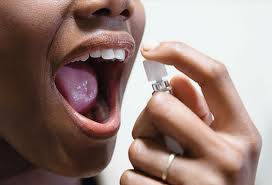Overview
 Makers
of mints and mouthwashes sell millions of dollars worth of products every year.
However, these products are only temporarily helpful for controlling bad breath
(halitosis). They actually may be less effective than simply rinsing your mouth
with water and brushing and flossing your teeth.
Makers
of mints and mouthwashes sell millions of dollars worth of products every year.
However, these products are only temporarily helpful for controlling bad breath
(halitosis). They actually may be less effective than simply rinsing your mouth
with water and brushing and flossing your teeth.
Certain foods, health conditions and habits are among the causes of bad
breath. In many cases, bad breath can be improved with proper dental
hygiene.
Bad breath (halitosis) can be caused by many things. It may be the result of
odor-causing foods, tooth decay, periodontal (gum) disease, continued mouth
dryness, use of tobacco products, sinus or respiratory infections, some medical
disorders, inadequate oral hygiene or some medications. Your dentist can help
identify the cause and, if it’s due to an oral condition, can develop a
treatment plan to eliminate this common source of embarrassment.
What Causes Bad Breath?
What you eat affects the air you exhale. Certain foods, such as garlic and
onions, contribute to objectionable breath odor. Once the food is absorbed into
the bloodstream, it is transferred to the lungs, where it is expelled. Brushing,
flossing and mouthwash will only mask the odor temporarily. Odors continue until
the body eliminates the food. Dieters may develop unpleasant breath from
infrequent eating.
If you don’t brush and floss daily, particles of food remain in the mouth,
collecting bacteria, which can cause bad breath. Food that collects between the
teeth, on the tongue and around the gums can rot, leaving an unpleasant odor.
Dentures that are not cleaned properly can also harbor odor-causing bacteria and
food particles.
One of the warning signs of periodontal (gum) disease is persistent bad
breath or a bad taste in the mouth. Periodontal disease is caused by plaque, the
sticky, colorless film of bacteria that constantly forms on teeth. The bacteria
create toxins that irritate the gums. In the advanced stage of the disease, the
gums, bone and other structures that support the teeth become damaged. With
regular dental checkups, your dentist can detect and treat periodontal disease
early.
 Bad
breath is also caused by dry mouth (xerostomia), which occurs when the flow of
saliva decreases. Saliva is necessary to cleanse the mouth and remove particles
that may cause odor. Dry mouth may be caused by various medications, salivary
gland problems or continuously breathing through the mouth. If you suffer from
dry mouth, your dentist may prescribe an artificial saliva, or suggest using
sugarless candy and increasing your fluid intake.
Bad
breath is also caused by dry mouth (xerostomia), which occurs when the flow of
saliva decreases. Saliva is necessary to cleanse the mouth and remove particles
that may cause odor. Dry mouth may be caused by various medications, salivary
gland problems or continuously breathing through the mouth. If you suffer from
dry mouth, your dentist may prescribe an artificial saliva, or suggest using
sugarless candy and increasing your fluid intake.
Tobacco products cause bad breath, stain teeth, reduce one’s ability to taste
foods and irritate gum tissues. Tobacco users are more likely to suffer from
periodontal disease and are at greater risk for developing oral cancer. If you
use tobacco, ask your dentist for tips on kicking the habit.
Bad breath may be the sign of a medical disorder, such as a local infection
in the respiratory tract (nose throat, windpipe, lungs), chronic sinusitis,
postnasal drip, chronic bronchitis, diabetes, gastrointestinai disturbance,
liver or kidney ailment. If your dentist determines that your mouth is healthy,
you may be referred to your family doctor or a specialist to determine the cause
of bad breath.
Caring for Your Smile
Eliminating periodontal disease and maintaining good oral health is essential
to reducing bad breath. Schedule regular dental visits for a professional
cleaning and checkup. If you think you have constant bad breath, keep a log of
the foods you eat and make a list of medications you take. Some medications may
play a role in creating mouth odors. Let your dentist know if you’ve had any
surgery or illness since your last appointment.
Brush twice a day with a fluoride toothpaste to remove food debris and
plaque. Brush your tongue, too. Once a day, use floss or an interdental cleaner
to clean between teeth. If you wear removable dentures, take them out at night.
Clean them thoroughly before replacing them the next morning.
Mouthwashes are generally cosmetic and do not have a long-lasting effect on
bad breath. If you must constantly use a breath freshener to hide unpleasant
mouth odor, see your dentist. If you need extra help in controlling plaque, your
dentist may recommend using a special antimicrobial mouthrinse. A fluoride
mouthrinse, used along with brushing and flossing, can help prevent tooth
decay.
Look for products that carry the American Dental Association Seal of
Acceptance. Products that display the seal have undergone strict testing for
safety and effectiveness.